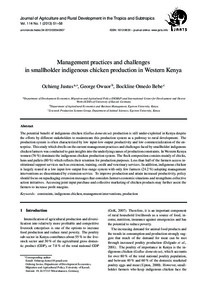Aufsatz

Management practices and challenges in smallholder indigenous chicken production in Western Kenya
Zusammenfassung
The potential benefit of indigenous chicken (Gallus domesticus) production is still under-exploited in Kenya despite the efforts by different stakeholders to mainstream this production system as a pathway to rural development. The production system is often characterized by low input-low output productivity and low commercialization of the enterprise. This study which dwells on the current management practices and challenges faced by smallholder indigenous chicken farmers was conducted to gain insights into the underlying causes of production constraints. In Western Kenya women (76%) dominate the indigenous chicken production system. The flock composition consists mainly of chicks, hens and pullets (80%) which reflects their retention for production purposes. Less than half of the farmers access institutional support services such as extension, training, credit and veterinary services. In addition, indigenous chicken is largely reared in a low input-low output free-range system with only few farmers (24.2%) adopting management interventions as disseminated by extension service. To improve production and attain increased productivity, policy should focus on repackaging extension messages that considers farmers economic situations and strengthens collective action initiatives. Accessing joint input purchase and collective marketing of chicken products may further assist the farmers to increase profit margins.
Zitierform
In: Journal of Agriculture and Rural Development in the Tropics and Subtropics. Kassel : Kassel University Press. - Vol. 114, No. 1 (2013), S. 51-58Sammlung(en)
Vol 114, No 1 (2013) (Journal of Agriculture and Rural Development in the Tropics and Subtropics (JARTS))Zitieren
@article{urn:nbn:de:hebis:34-2013030542607,
author={Justus, Ochieng and Owuor, George and Bebe, Bockline Omedo},
title={Management practices and challenges in smallholder indigenous chicken production in Western Kenya},
year={2013}
}
0500 Oax 0501 Text $btxt$2rdacontent 0502 Computermedien $bc$2rdacarrier 1100 2013$n2013 1500 1/eng 2050 ##0##urn:nbn:de:hebis:34-2013030542607 3000 Justus, Ochieng 3010 Owuor, George 3010 Bebe, Bockline Omedo 4000 Management practices and challenges in smallholder indigenous chicken production in Western Kenya / Justus, Ochieng 4030 4060 Online-Ressource 4085 ##0##=u http://nbn-resolving.de/urn:nbn:de:hebis:34-2013030542607=x R 4204 \$dAufsatz 4170 7136 ##0##urn:nbn:de:hebis:34-2013030542607
<resource xsi:schemaLocation="http://datacite.org/schema/kernel-2.2 http://schema.datacite.org/meta/kernel-2.2/metadata.xsd"> 2013-08-13T08:42:17Z 2013-08-13T08:42:17Z 2013 1612-9830 urn:nbn:de:hebis:34-2013030542607 http://hdl.handle.net/123456789/2013030542607 eng Kassel University Press Urheberrechtlich geschützt https://rightsstatements.org/page/InC/1.0/ constraints indigenous chicken management interventions production 630 Management practices and challenges in smallholder indigenous chicken production in Western Kenya Aufsatz The potential benefit of indigenous chicken (Gallus domesticus) production is still under-exploited in Kenya despite the efforts by different stakeholders to mainstream this production system as a pathway to rural development. The production system is often characterized by low input-low output productivity and low commercialization of the enterprise. This study which dwells on the current management practices and challenges faced by smallholder indigenous chicken farmers was conducted to gain insights into the underlying causes of production constraints. In Western Kenya women (76%) dominate the indigenous chicken production system. The flock composition consists mainly of chicks, hens and pullets (80%) which reflects their retention for production purposes. Less than half of the farmers access institutional support services such as extension, training, credit and veterinary services. In addition, indigenous chicken is largely reared in a low input-low output free-range system with only few farmers (24.2%) adopting management interventions as disseminated by extension service. To improve production and attain increased productivity, policy should focus on repackaging extension messages that considers farmers economic situations and strengthens collective action initiatives. Accessing joint input purchase and collective marketing of chicken products may further assist the farmers to increase profit margins. open access In: Journal of Agriculture and Rural Development in the Tropics and Subtropics. Kassel : Kassel University Press. - Vol. 114, No. 1 (2013), S. 51-58 Justus, Ochieng Owuor, George Bebe, Bockline Omedo Gedruckte Ausg. im Verlag Kassel Univ. Press (www.upress.uni-kassel.de) erschienen. </resource>
Die folgenden Lizenzbestimmungen sind mit dieser Ressource verbunden:
Urheberrechtlich geschützt

